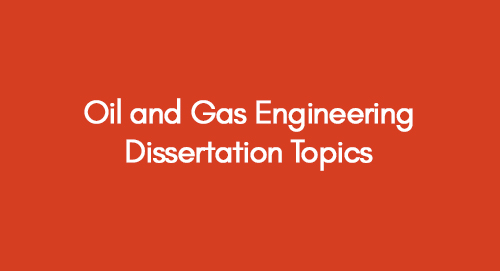
List of 158+ Marketing Dissertation Topics in 2025
November 14, 2020
List of 162+ Politics Dissertation Topics in 2025
November 15, 2020Oil and gas refer to natural resources extracted from beneath the Earth's surface for various industrial applications. These are the fossil fuels that run the wheel of the industry worldwide. Climate change in the form of ever-increasing global warming has raised doubts about oil and gas efficacy, leading to increased petroleum research momentum. Thus, Students and researchers need quality oil and gas dissertation topics to analyse problems and devise solutions.
Health and Safety Dissertation Topics
Premier Dissertations has developed a list of 160+ up-to-date dissertation topics in oil and gas to help them find the most inspiring topic.
Oil Field Safety Dissertation Topics | Engineering Management Dissertation Topics
Latest Oil and Gas Research Topics For 2025
Top Trending Research Topics in Oil and Gas
Oil and Gas Management Topics
Best Thesis Topics in Oil and Gas
Researched-Based Oil and Gas Thesis Topics
Oil and Gas Research Topics for Undergraduate Students in 2025
Topic 45. Analysing the Role of Renewable Energy Policies in Shaping the Future of the Oil and Gas Industry: A Systematic Study
Topic 46. Examining the Environmental Impact of Hydraulic Fracturing in Shale Gas Extraction: A Case Study
Topic 47. Assessing the Role of Artificial Intelligence in Enhancing Efficiency in Oil Refining Processes: A Quantitative Study
Topic 48. Understanding the Challenges of Carbon Capture and Storage in the Oil and Gas Sector: A Qualitative Study
Topic 49. Evaluating the Impact of Corporate Social Responsibility Initiatives on Community Development in Oil-Producing Regions: A Systematic Study
Topic 50. Analysing the Influence of Geopolitical Risks on Oil Price Volatility: A Case Study of the Middle East
Topic 51. Examining the Role of Digital Twins in Optimizing Upstream Oil Exploration Processes: A Quantitative Study
Topic 52. Assessing the Effectiveness of Environmental Impact Assessments in Offshore Drilling Projects: A Qualitative Study
Topic 53. Understanding the Role of Supply Chain Resilience in Managing Oil and Gas Logistics During Global Disruptions: A Case Study
Topic 54. Evaluating the Impact of Digital Transformation on Workforce Management in the Oil and Gas Industry: A Systematic Study
Topic 55. Analysing the Role of Advanced Sensor Technologies in Monitoring Pipeline Integrity: A Quantitative Study
Topic 56. Examining the Economic Impacts of Oil Price Fluctuations on Developing Countries: A Case Study of Nigeria
Topic 57. Assessing the Challenges of Implementing Renewable Energy Projects in Oil-Dependent Economies: A Qualitative Study
Topic 58. Understanding the Role of Machine Learning in Predicting Reservoir Performance: A Quantitative Study
Topic 59. Evaluating the Influence of International Regulations on Offshore Oil Spill Prevention Strategies: A Systematic Study
Topic 60. Analysing the Effectiveness of Renewable Energy Integration in Reducing Carbon Emissions in Oil Companies: A Case Study
Topic 61. Examining the Role of Stakeholder Collaboration in Ensuring Sustainability in Oil Sands Projects: A Qualitative Study
Topic 62. Assessing the Challenges of Workforce Diversity in Multinational Oil and Gas Companies: A Quantitative Study
Topic 63. Understanding the Role of Blockchain Technology in Enhancing Transparency in Oil Trading: A Systematic Study
Topic 64. Evaluating the Role of Green Finance in Supporting Sustainable Practices in the Oil and Gas Industry: A Case Study
Topic 65. Analysing the Economic Viability of Small-Scale LNG Production in Developing Markets: A Quantitative Study
Topic 66. Examining the Social Impacts of Displacement Due to Oil Exploration in Rural Communities: A Qualitative Study
Topic 67. Assessing the Role of Predictive Maintenance in Reducing Downtime in Offshore Platforms: A Systematic Study
Topic 68. Understanding the Challenges of Adopting Biofuels in Oil-Dependent Industries: A Case Study
Topic 69. Evaluating the Impact of Public Perception on Policy Development in Hydraulic Fracturing Projects: A Qualitative Study
Topic 70. Analysing the Role of 3D Seismic Imaging in Enhancing Exploration Accuracy: A Quantitative Study
Topic 71. Examining the Environmental Policies of Major Oil Companies in Achieving Net-Zero Goals: A Systematic Study
Topic 72. Assessing the Effectiveness of Leadership Styles in Promoting Health and Safety in Oil Refineries: A Case Study
Topic 73. Understanding the Challenges of Decommissioning Aging Offshore Platforms: A Qualitative Study
Topic 74. Evaluating the Impact of Risk Management Practices on Project Success in Deepwater Drilling: A Quantitative Study
Topic 75. Analysing the Role of Corporate Governance in Enhancing Transparency in Oil Export Contracts: A Systematic Study
Topic 76. Examining the Role of Smart Contracts in Streamlining Procurement in Oil and Gas Projects: A Case Study
Topic 77. Assessing the Potential of Hydrogen Production as a Transition Fuel for Oil Companies: A Quantitative Study
Topic 78. Understanding the Social and Economic Consequences of Oil Dependency in Emerging Economies: A Qualitative Study
Topic 79. Evaluating the Effectiveness of Disaster Management Strategies in Oil Spill Response: A Systematic Study
Topic 80. Analysing the Impact of Decarbonization Goals on Capital Investment Decisions in the Oil Sector: A Case Study
Topic 81. Examining the Role of Enhanced Oil Recovery Techniques in Extending Field Life: A Quantitative Study
Topic 82. Assessing the Effectiveness of Corporate Strategies in Mitigating Climate Risks in Oil Operations: A Qualitative Study
Topic 83. Understanding the Role of Digitalization in Transforming Operational Efficiencies in Oil Refineries: A Systematic Study
Oil and Gas Dissertation Topics for Master Students in 2025
Topic 84. Analysing the Impact of Carbon Pricing Policies on Oil and Gas Companies' Profitability: A Quantitative Study
Topic 85. Examining the Role of Green Hydrogen in Decarbonizing the Oil and Gas Sector: A Systematic Study
Topic 86. Assessing the Effectiveness of Enhanced Oil Recovery (EOR) Methods in Extending Reservoir Lifespan: A Case Study
Topic 87. Understanding the Challenges of Adopting Circular Economy Practices in the Oil and Gas Industry: A Qualitative Study
Topic 88. Evaluating the Role of Blockchain Technology in Improving Supply Chain Transparency in Oil Trading: A Systematic Study
Topic 89. Analysing the Relationship Between Geopolitical Conflicts and Oil Price Volatility: A Case Study
Topic 90. Examining the Impact of Renewable Energy Integration on the Strategic Planning of Oil and Gas Companies: A Qualitative Study
Topic 91. Assessing the Effectiveness of Environmental Regulations in Mitigating Offshore Drilling Risks: A Systematic Study
Topic 92. Understanding the Potential of Artificial Intelligence in Predictive Maintenance for Oil Refining Equipment: A Quantitative Study
Topic 93. Evaluating the Social Responsibility Initiatives of Oil and Gas Companies in Host Communities: A Case Study
Topic 94. Analysing the Impact of Digital Twin Technology on Offshore Platform Operations: A Qualitative Study
Topic 95. Examining the Economic Impacts of LNG Exportation on Emerging Markets: A Systematic Study
Topic 96. Assessing the Role of Risk Management Practices in Enhancing Safety in Oil Storage Facilities: A Quantitative Study
Topic 97. Understanding the Challenges of Implementing Renewable Energy Technologies in Oil-Producing Regions: A Qualitative Study
Topic 98. Evaluating the Impact of Employee Training Programs on Operational Efficiency in Oil Refineries: A Systematic Study
Topic 99. Analysing the Role of Policy Frameworks in Supporting the Transition to Cleaner Energy Sources in Oil-Producing Nations: A Case Study
Topic 100. Examining the Feasibility of Biofuels as a Replacement for Traditional Oil Products in Transportation: A Quantitative Study
Topic 101. Assessing the Effects of Digital Transformation on the Competitive Advantage of Oil and Gas Companies: A Qualitative Study
Topic 102. Understanding the Role of Corporate Governance in Mitigating Corruption in Oil Export Contracts: A Systematic Study
Topic 103. Evaluating the Adoption of Internet of Things (IoT) Solutions for Real-Time Monitoring in Pipeline Infrastructure: A Quantitative Study
Topic 104. Analysing the Relationship Between Energy Security Policies and Oil Exploration Investments: A Case Study
Topic 105. Examining the Impact of Public Perception on the Adoption of Hydraulic Fracturing Projects: A Qualitative Study
Topic 106. Assessing the Role of Big Data Analytics in Forecasting Oil Demand Trends: A Systematic Study
Topic 107. Understanding the Challenges of Decommissioning Aging Oil and Gas Infrastructure: A Case Study
Topic 108. Evaluating the Role of Financial Incentives in Promoting Carbon Capture Utilization and Storage (CCUS) Projects: A Quantitative Study
Topic 109. Analysing the Influence of Cultural Differences on Stakeholder Collaboration in Multinational Oil Projects: A Qualitative Study
Topic 110. Examining the Economic Viability of Small-Scale LNG Production in Remote Areas: A Systematic Study
Topic 111. Assessing the Effectiveness of Health and Safety Practices in Reducing Workplace Accidents in Oil Platforms: A Quantitative Study
Topic 112. Understanding the Potential of Renewable Energy Partnerships in Reducing Carbon Emissions in the Oil Sector: A Case Study
Topic 113. Evaluating the Role of Digital Marketing in Enhancing Brand Image for Oil and Gas Companies: A Qualitative Study
Topic 114. Analysing the Impact of Subsidy Removal on Oil Consumption Patterns in Developing Economies: A Quantitative Study
Topic 115. Examining the Effectiveness of Joint Ventures in Mitigating Risks in Deepwater Exploration Projects: A Systematic Study
Topic 116. Assessing the Role of Social Media Campaigns in Shaping Public Opinion on Oil Exploration Projects: A Qualitative Study
Topic 117. Understanding the Influence of Economic Sanctions on Oil Export Strategies: A Case Study
Topic 118. Evaluating the Role of Renewable Energy Co-Generation in Achieving Sustainable Operations in Oil Refineries: A Quantitative Study
Topic 119. Analysing the Effectiveness of Waste Management Strategies in Oil Sands Operations: A Systematic Study
Topic 120. Examining the Role of Educational Initiatives in Promoting Gender Diversity in the Oil and Gas Industry: A Qualitative Study
Topic 121. Assessing the Challenges of Water Resource Management in Hydraulic Fracturing Projects: A Case Study
Topic 122. Understanding the Role of Strategic Alliances in Advancing Renewable Energy Adoption Among Oil Companies: A Systematic Study
Oil and Gas Thesis Topics for PhD Students in 2025
Topic 123. Analysing the Impact of Energy Transition Policies on Oil and Gas Investment Decisions: A Quantitative Study
Topic 124. Examining the Role of Artificial Intelligence in Optimising Upstream Oil Exploration Processes: A Systematic Study
Topic 125. Assessing the Long-Term Environmental Consequences of Hydraulic Fracturing in Unconventional Oil Reserves: A Case Study
Topic 126. Understanding the Socioeconomic Impact of Oil and Gas Projects on Indigenous Communities: A Qualitative Study
Topic 127. Evaluating the Role of Carbon Capture and Storage (CCS) in Achieving Net-Zero Emissions in Oil Refineries: A Quantitative Study
Topic 128. Analysing the Effects of OPEC Production Strategies on Global Oil Market Stability: A Systematic Study
Topic 129. Examining the Efficiency of Bio-Based Lubricants as Alternatives in Oil and Gas Machinery: A Case Study
Topic 130. Assessing the Challenges of Decommissioning Aging Offshore Oil Platforms: A Qualitative Study
Topic 131. Understanding the Relationship Between Oil Price Volatility and Renewable Energy Investments: A Quantitative Study
Topic 132. Evaluating the Effectiveness of Blockchain in Enhancing Transparency in Oil Supply Chains: A Systematic Study
Topic 133. Analysing the Impact of Climate Change Policies on Natural Gas Export Markets: A Case Study
Topic 134. Examining the Role of Corporate Sustainability Practices in Enhancing Stakeholder Trust in Oil and Gas Companies: A Qualitative Study
Topic 135. Assessing the Integration of Renewable Energy in Offshore Oil Rig Operations: A Systematic Study
Topic 136. Understanding the Economic Impacts of Shale Gas Exploration in Emerging Markets: A Quantitative Study
Topic 137. Evaluating the Role of Technological Innovations in Reducing Greenhouse Gas Emissions in Oil Sands Operations: A Case Study
Topic 138. Analysing the Feasibility of Hydrogen as a Byproduct in Oil Refining Processes: A Systematic Study
Topic 139. Examining the Role of Public Perception in Shaping Regulatory Policies for Offshore Drilling: A Qualitative Study
Topic 140. Assessing the Potential of Digital Twins in Enhancing Predictive Maintenance for Oil Refineries: A Quantitative Study
Topic 141. Understanding the Impact of International Sanctions on Oil and Gas Infrastructure Development: A Case Study
Topic 142. Evaluating the Strategic Importance of LNG in Diversifying Energy Portfolios: A Systematic Study
Topic 143. Analysing the Challenges of Implementing Carbon Tax in Oil-Dependent Economies: A Qualitative Study
Topic 144. Examining the Economic Benefits of Reusing Wastewater in Hydraulic Fracturing Operations: A Quantitative Study
Topic 145. Assessing the Role of Knowledge Management in Improving Operational Efficiency in Oil Exploration: A Case Study
Topic 146. Understanding the Impact of Renewable Energy Policies on Oil Field Services Companies: A Systematic Study
Topic 147. Evaluating the Use of Autonomous Robots in Subsea Exploration for Enhanced Accuracy: A Qualitative Study
Topic 148. Analysing the Relationship Between Corporate Governance and Environmental Compliance in Oil Companies: A Quantitative Study
Topic 149. Examining the Role of Gas-to-Liquid (GTL) Technology in Transforming Natural Gas Markets: A Systematic Study
Topic 150. Assessing the Economic Feasibility of Enhanced Oil Recovery in Mature Fields: A Case Study
Topic 151. Understanding the Role of Energy Storage Solutions in Supporting Oil and Gas Operations During Peak Demand: A Qualitative Study
Topic 152. Evaluating the Impact of Decarbonisation Goals on Strategic Decision-Making in Oil Majors: A Quantitative Study
Topic 153. Analysing the Potential of Offshore Wind Partnerships for Oil and Gas Companies in Transitioning to Renewable Energy: A Systematic Study
Topic 154. Examining the Socioeconomic Impacts of Oil Revenue Decline on Local Economies: A Qualitative Study
Topic 155. Assessing the Role of National Oil Companies in Achieving Energy Transition Goals: A Case Study
Topic 156. Understanding the Challenges of Digitalising Oil Rig Operations in Remote Locations: A Systematic Study
Topic 157. Evaluating the Economic Impacts of Green Bonds on Financing Oil Field Carbon Offset Projects: A Quantitative Study
Topic 158. Analysing the Effectiveness of Carbon Markets in Reducing Emissions in Oil-Producing Regions: A Qualitative Study
Topic 159. Examining the Role of Renewable Energy Integration in Enhancing Offshore Oil Platform Sustainability: A Systematic Study
Topic 160. Assessing the Challenges of Energy Equity in Oil and Gas Exploration in Developing Economies: A Case Study
Can the Students Use the Listed Topics in Oil and Gas?
Finding a good topic is crucial when it comes to writing a dissertation on petroleum engineering. The topics related to oil and gas management are available for all students studying in this course for free. However, you must know that the research proposal for oil and gas management starts with a near-perfect topic.
As oil and gas is a rigorous field that combines technical skills and academic principles, it can be challenging to come up with project topics. To help students, our expert writers have created a list of thesis topics for petroleum engineering students. The list includes innovative ideas that also cover dissertation topics in petroleum economics, which you may not find elsewhere on the internet.
What makes our list of petroleum research topics unique is that it considers the market realities of the petroleum sector and does not simply repeat old theories.
The Importance of Finding a Good Oil and Gas Topic for Your Petroleum Engineering Dissertation
Petroleum and Environmental Technology involves extracting hydrocarbons like crude oil or natural gas. Petroleum engineers research and develop technologies to optimize oil and gas recovery processes. Students must choose quality topics for their oil and gas management dissertation. We have a list of potential topics to help.
Review the Full list of Dissertation Topics
For more project titles in oil and gas, please keep checking our website as we keep adding new topics to our existing list of titles.
Get 3+ Oil & Gas Engineering Free Dissertation Topics within 24 hours?


























